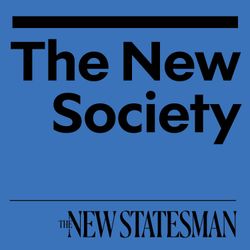Share

Daily Politics from the New Statesman
Tory leadership election: who's running?
At the time of recording, 11 Conservative MPs had launched official bids to replace Boris Johnson as prime minister. Anoosh Chakelian, Freddie Hayward and Ben Walker discuss the candidates' prospects, promises and pitfalls – as well as how the leadership election could reshape the Conservative Party.
Then in You Ask Us, a listener asks which Tory candidate would pose the biggest threat to the Labour Party.
If you have a question for You Ask Us, email podcasts@newstatesman.co.uk
Podcast listeners can subscribe to the New Statesman for just £1 a week for 12 weeks using our special offer. Just visit newstatesman.com/podcastoffer.
SAVE £££ THIS CHRISTMAS:
⭐️ Gift big ideas, bold politics, and proper journalism from just £2
LISTEN AD-FREE:
📱Download the New Statesman app
MORE FROM THE NEW STATESMAN:
❓ Ask a question – we answer them every Friday
⏰ Get our daily politics newsletter every morning
✍️ Enjoy the best of our writing via email every Saturday
More episodes
View all episodes

Why Keir Starmer U-turned on digital ID
28:58|How many U-turns before you admit you don’t know where you’re going?As little as four months ago, Keir Starmer said: "You will not be able to work in the UK if you don't have a digital ID, it's as simple as that." Now, he’s done yet another 180. Oli Dugmore is joined by Anoosh Chakelian and Ailbhe Rea.
Keir Starmer: Grok imagery “disgraceful”
33:50|Keir Starmer is challenging Elon Musk and x.com over AI generated non-consensual intimate images.A proliferation of these images, generated by x.com’s AI chatbot Grok, has flooded the platform. Users have been instructing Grok to create these images of high profile figures and even of children.The British government have announced they will introduce legislation to prevent these images. This debate has raised issues of free speech, big tech, power and transatlantic relations.Oli Dugmore unpacks it all with Tom McTague and Ailbhe Rea.📚 READ: Why Keir Starmer has gone to war with Elon Musk - George Eatonhttps://www.newstatesman.com/politics/uk-politics/2026/01/why-keir-starmer-has-gone-to-war-with-elon-musk
Nadhim Zahawi defects from the Tories to Reform
14:30|"Britain needs Nigel Farage as prime minister” said the former chancellor.Oli Dugmore is joined by Rachel Cunliffe and Ailbhe Rea.
An interview with Salman Rushdie
30:55|We’re launching our new culture and society podcast here at the New Statesman: The New Society.Tanjil Rashid, the New Statesman's culture editor, discusses his interview with Salman Rushdie, Rushdie's latest work as a reflection of his life, and also what listeners can expect to hear on future episodes of this new podcast.You can find the full interview via the links below.Follow The New Society on SpotifyFollow The New Society on Apple PodcastsWatch The New Society on YouTube
Blue Labour is splitting the party
32:17|Labour is splitting.Earlier this week we reported that the government is now THIRD in the opinion polls behind Reform and the Tories.Now, as they barrel inexorably towards testing local elections in May, rifts are emerging within the Labour party. This week, Preet Kaur Gill – a personal private secretary to Home Secretary Shabhana Mahmood – announced in the Telegraph, of all places, that she (Preet Kaur Gill) is “Blue Labour”.The intervention sparked fierce debate among MPs, with divisions down ideological lines.Can the party hold it together?Oli Dugmore is joined by Ethan Croft, who has been speaking to Labour MPs this week, and Megan Kenyon. LISTEN NEXT: It's official – Labour are in third place
Are we ready for a “Brexit reset”?
32:29|Keir Starmer is planning on developing a “closer relationship” with the single market.The PM wants to realign with the EU in three key areas to help the free flow of trade: food and farm exports, electricity and emissions trading.But what will this mean for Britain, and how is it going down in Westminster?Anoosh Chakelian is joined by associate political editor, Rachel Cunliffe.
It's official: Labour are in third place
21:09|Christmas polling has revealed that the Tories have edged past Labour into second place in the polls.Nigel Farage’s Reform UK are still sitting pretty in the top spot, with Zack Polanski’s insurgent Greens chasing Labour’s tail.With elections in May incoming, this is the last thing Labour need.
Russia suggested the US “swap” Venezuela for Ukraine
42:22|In 2019, according to a deposition, Russia signalled that they could ease off their support for Venezuela if Washington were to ease its own position in Ukraine. The testimony was delivered by Fiona Hill, a former senior director on the US’s national security council during the first Trump administration.Fiona Hill joins Megan Gibson to discuss that Russian proposal, as well as the US’s strike on Venezuela – and what this means for the global order.
Trump kidnaps Maduro, and Starmer says… nothing?
37:21|Emily Thornberry MP joins us to discuss the US's actions in Venezuela, the legality, and the international response. In the second half of the podcast, the Chair of the Foreign Affairs Committee reflects on Starmer's moves to a closer relationship with the EU.